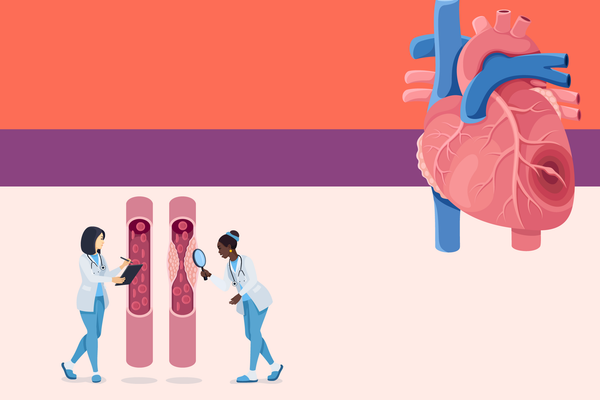Most cholesterol tests will usually measure triglycerides, but they aren’t a type of cholesterol. However, triglycerides are related to the two types of cholesterol: LDL and HDL. Like cholesterol, triglycerides are types of lipids (or fats) that travel through the blood to perform essential functions in the body. And, like LDL cholesterol, high levels of triglycerides can pose risks to heart health.
We reached out to New York cardiologist and member of the HealthyWomen Women’s Health Advisory Council Nieca Goldberg, M.D., to talk about what we can do to manage high triglycerides.
How do high levels of triglycerides affect my risk of heart attack or stroke?
A standard lipid panel measures levels of total cholesterol as well as triglycerides, but this number is often overlooked. It shouldn’t be, because high levels of triglycerides raise the risk of heart attack and stroke by promoting atherosclerosis — the build-up of cholesterol and inflammatory factors — in the walls of the blood vessels that supply blood to the heart muscle. Very high triglycerides are also associated with inflammation of the pancreas (pancreatitis), which is another important reason to keep triglycerides in check.
How do I know if I have high triglycerides?
There are no symptoms if you have high triglycerides. So, the first step is to get a lipid panel and ask about your triglyceride level. Borderline high levels are above 150 milligrams per deciliter (mg/dL), high levels are greater than 200 mg/dL, and very high levels are above 500 mg/dL.If the level is greater than 150 mg/dL, talk to your healthcare provider about the best approach to managing cardiovascular risk associated with any level of elevated triglycerides.
Should I avoid certain foods if I have high triglycerides levels?
The first step to managing cardiovascular risk associated with elevated and high triglyceride levels is to look at what you’re eating. Alcohol, fats, simple carbohydrates and sugars can all raise your triglycerides. Instead of eating foods that are high in saturated fat, simple sugars and starches, eat a Mediterranean-style diet with complex carbohydrates — such as whole grains — and plenty of fruits, vegetables and healthy fats like omega-3. These are the types of fats found in fish, olive, canola or avocado oil. Diet and exercise leading to weight loss can improve triglyceride levels. It’s also smart to reduce your alcohol intake.
How can I lower my triglycerides and my risk of cardiovascular disease?
Oftentimes, if triglycerides are mildly elevated, a simple dietary change like eating more fish is sufficient, along with switching to a healthy diet and exercising more. However, if your levels are moderate to high, your doctor may order prescription-strength fish oil or omega-3s, which has higher levels of omega-3 fatty acids than over-the-counter dietary supplement options. Some of these prescription-strength fish oils contain omega-3 fatty acids called EPA (eicosapentaenoic acid) and DHA (docosahexaenoic acid), and others contain only a purified form of EPA called IPE (icosapent ethyl). All of these products will lower your triglycerides and may decrease your risk of pancreatitis, but they don’t all lower your risk for heart disease, heart attack and stroke. However, prescription-strength omega-3 with pure EPA, called IPE, has been proven in clinical trials to reduce your risk of cardiovascular disease when used with statins, drugs used to lower cholesterol.
Another medication called fibrates can lower triglycerides, but the most commonly used fibrates haven’t been shown to lower the risk of heart attack or stroke.
This educational resource was created with support from Amarin.
- A Cardiologist Explains If Alcohol Is Good for Your Heart ›
- What You Need to Know About Cholesterol ›
- What’s Your Number? ›
- Cholesterol-Lowering Drugs 101 ›
- Triglycerides 101: What They Are and Why They Matter ›
- Questions to Ask Your Doctor About High Cholesterol - HealthyWomen ›





